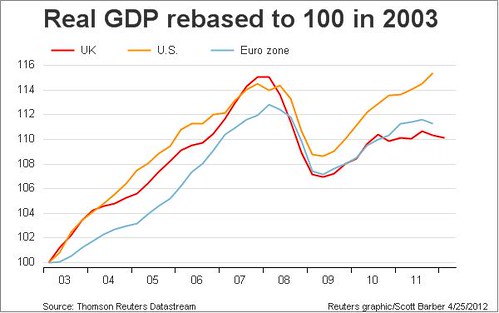The United Kingdom has fallen back into recession. Scott Barber – via Joe Weisenthal – charts the economic performance there against the performance here.
 The numbers start to diverge in 2010. What happened in 2010? In May, the Labour government was ousted and replaced by a Conservative-Liberal Democrat coalition. In power, the coalition immediately set about cutting spending (by roughly $11 billion) and raising taxes. The goal: A balanced budget by 2015.
The result: The sort of slow growth that any Keynesian could have warned you about. S&P had this to say about it.
The numbers start to diverge in 2010. What happened in 2010? In May, the Labour government was ousted and replaced by a Conservative-Liberal Democrat coalition. In power, the coalition immediately set about cutting spending (by roughly $11 billion) and raising taxes. The goal: A balanced budget by 2015.
The result: The sort of slow growth that any Keynesian could have warned you about. S&P had this to say about it.
[W]e believe that a reform process based on a pillar of fiscal austerity alone risks becoming self-defeating, as domestic demand falls in line with consumers’ rising concerns about job security and disposable incomes, eroding national tax revenuesThe political result, though? Here’s where the parliamentary system bails out Britain’s austerity-pushers. The coalition can pass any budget it likes. The next election will come either 1) when the government falls or 2) by 2015. (That year again.) Polls suggest that Labour would storm back into power if the election were held tomorrow. The election won’t be held tomorrow, and the by-elections to replace retiring members aren’t breaking against the Conservatives. Four weeks ago, Labour lost a safe seat largely because “the Asian community” (typically, Brit-speak for immigrants from Muslim counties) rebelled. The Liberal Democrats have collapsed in popularity since joining the coalition, so they’re desparate to avoid a new election. The result: Endless mobility for the government to pursue austerity politics with no consequence. The only setbacks they could get this year would be local election losses and – a bigger symbolic problem – losing the mayoralty of London. But that’s nothing compared to, say, the situation facing Barack Obama in January 2009: Twenty-two months to turn things around before the voter replaced his Congress.